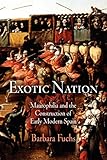Exotic Nation : Maurophilia and the Construction of Early Modern Spain / Barbara Fuchs.
Material type: TextPublisher: Philadelphia : University of Pennsylvania Press, [2011]Copyright date: ©2009Description: 1 online resource (208 p.) : 11 illusContent type:
TextPublisher: Philadelphia : University of Pennsylvania Press, [2011]Copyright date: ©2009Description: 1 online resource (208 p.) : 11 illusContent type: - 9780812221732
- 9780812207354
- 946/.02 22
- DP102 .F783 2011eb
- online - DeGruyter
- Issued also in print.
| Item type | Current library | Call number | URL | Status | Notes | Barcode | |
|---|---|---|---|---|---|---|---|
 eBook
eBook
|
Biblioteca "Angelicum" Pont. Univ. S.Tommaso d'Aquino Nuvola online | online - DeGruyter (Browse shelf(Opens below)) | Online access | Not for loan (Accesso limitato) | Accesso per gli utenti autorizzati / Access for authorized users | (dgr)9780812207354 |
Browsing Biblioteca "Angelicum" Pont. Univ. S.Tommaso d'Aquino shelves, Shelving location: Nuvola online Close shelf browser (Hides shelf browser)

|

|

|

|

|

|

|
||
| online - DeGruyter The Pleasure Garden, from Vauxhall to Coney Island / | online - DeGruyter The Decadent Republic of Letters : Taste, Politics, and Cosmopolitan Community from Baudelaire to Beardsley / | online - DeGruyter Ceramics / | online - DeGruyter Exotic Nation : Maurophilia and the Construction of Early Modern Spain / | online - DeGruyter Christian Society and the Crusades, 1198-1229 : Sources in Translation, including "The Capture of Damietta" by Oliver of Paderborn / | online - DeGruyter Becoming Christian : The Conversion of Roman Cappadocia / | online - DeGruyter Shakespeare's Stationers : Studies in Cultural Bibliography / |
Frontmatter -- Contents -- Introduction -- 1. The Quotidian and the Exotic -- 2. In Memory of Moors: History, Maurophilia, and the Built Vernacular -- 3. The Moorish Fashion -- 4. Playing the Moor -- 5. The Spanish Race -- Postscript: Moorish Commonplaces -- Notes -- Bibliography -- Index -- Acknowledgments
restricted access online access with authorization star
http://purl.org/coar/access_right/c_16ec
In the Western imagination, Spain often evokes the colorful culture of al-Andalus, the Iberian region once ruled by Muslims. Tourist brochures inviting visitors to sunny and romantic Andalusia, home of the ingenious gardens and intricate arabesques of Granada's Alhambra Palace, are not the first texts to trade on Spain's relationship to its Moorish past. Despite the fall of Granada to the Catholic Monarchs in 1492 and the subsequent repression of Islam in Spain, Moorish civilization continued to influence both the reality and the perception of the Christian nation that emerged in place of al-Andalus.In Exotic Nation, Barbara Fuchs explores the paradoxes in the cultural construction of Spain in relation to its Moorish heritage through an analysis of Spanish literature, costume, language, architecture, and chivalric practices. Between 1492 and the expulsion of the Moriscos (Muslims forcibly converted to Christianity) in 1609, Spain attempted to come to terms with its own Moorishness by simultaneously repressing Muslim subjects and appropriating their rich cultural heritage. Fuchs examines the explicit romanticization of the Moors in Spanish literature-often referred to as "literary maurophilia"-and the complex, often silent presence of Moorish forms in Spanish material culture. The extensive hybridization of Iberian culture suggests that the sympathetic depiction of Moors in the literature of the period does not trade in exoticism but instead reminded Spaniards of the place of Moors and their descendants within Spain. Meanwhile, observers from outside Spain recognized its cultural debt to al-Andalus, often deliberately casting Spain as the exotic racial other of Europe.
Issued also in print.
Mode of access: Internet via World Wide Web.
In English.
Description based on online resource; title from PDF title page (publisher's Web site, viewed 24. Apr 2022)


